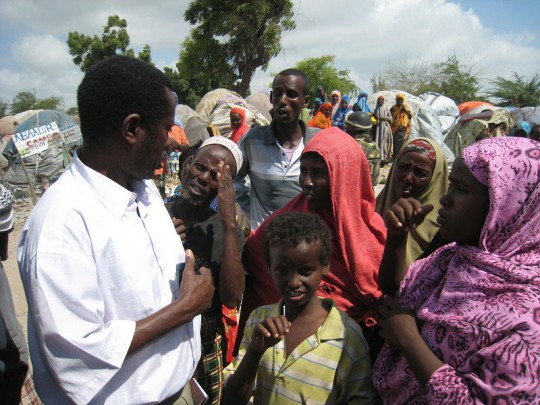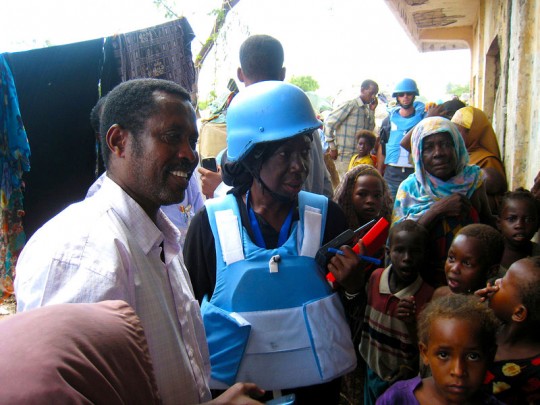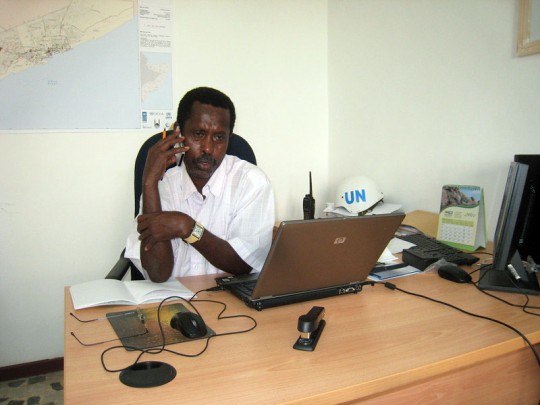FROM THE FIELD: Keeping hope alive in Mogadishu
FROM THE FIELD: Keeping hope alive in Mogadishu
 OCHA Humanitarian Affairs Officer Ahmed Farah Roble listens to IDPs at an IDP settlement in Mogadishu, Somalia
OCHA Humanitarian Affairs Officer Ahmed Farah Roble listens to IDPs at an IDP settlement in Mogadishu, Somalia
It is a hot, dusty morning in Mogadishu, the war-ravaged capital of Somalia, and Ahmed Farah Roble is in a makeshift settlement for internally displaced persons (IDPs), listening to a mother tell him about her baby daughter.
Ahmed nods patiently, asks questions and listens attentively. He is in the camp to meet with its representatives, to learn more about their situation. Many have recently arrived from the country’s south, fleeing hunger and conflict. They have very little, and urgently need food and medicine, shelter and health care.
It is hard not to be affected by what he sees and hears, especially as the 45-year-old was born and raised in Mogadishu. As the longest-serving UN humanitarian affairs officer in the capital, Ahmed has heard many similar heart-breaking tales before.
I’m one of those who was here in the golden days, when the situation was good. These last 20 years, when the country was devastated by endless and continuous conflict, it is really painful for me.
“But it is painful, still. I can say that, before, this was a peaceful city. It was paradise. Now, these people living here have lost everything, their property, opportunities for education. There are not enough health services. There is no safe drinking water in some areas,” he says.
“I’m one of those who was here in the golden days, when the situation was good. These last 20 years, when the country was devastated by endless and continuous conflict, it is really painful for me.”
 Ahmed Farah Roble and UNHCR staff see first-hand the conditions at IDP settlement in Mogadishu, Somalia.
Ahmed Farah Roble and UNHCR staff see first-hand the conditions at IDP settlement in Mogadishu, Somalia.
For much of the past four years, through some of Mogadishu’s heaviest fighting, he was the lone man on the ground for the UN Office for the Coordination of Humanitarian Affairs (OCHA) – the part of the UN responsible for bringing together humanitarian groups to ensure a coherent response to emergencies.
The situation has been so dangerous that, until recently, OCHA was unable to deploy more staff to join him.
“It was not an easy task to work here then,” says Ahmed. “All of the humanitarian community was targeted, no matter whether they were international or national. You could be targeted, kidnapped and killed at any time.” “It was a critical time, and even for me it was very difficult to get access to the people most in need.”
National staff members like Ahmed make up more than 90 per cent of humanitarian workers around the world, working on the frontlines. Too often, they bear the brunt of violence, as illustrated today with the deaths of two staff members of the UN World Food Programme (WFP) and a colleague working for a partner organization in central Somalia.
The dangers of working in Somalia, and restricted access for internationals, have led to a greater reliance on national staff, as well as local partners.
“International staff bring a wealth of technical experience to this crisis, but the role played by national staff is just as important,” says Marcel Stoessel, the head of OCHA’s sub-office in Mogadishu. “After all, nobody knows Somalia better than the Somalis – and without the local expertise of our national colleagues, international staff couldn’t do their jobs.”
“National staff speak the local language and often some local dialects as well, so they can more easily interact with people. They also understand the clan structure in Somalia, which is important if one wants to be successful in this humanitarian operation. They help us make crucial links with the government.
“Last, but not least, it’s much safer for them to move around Mogadishu than it is for international staff. People like Ahmed are our ‘humanitarian eyes and ears’.”
Ahmed’s family is in a neighbouring country for safety. For much of the time that he has been in Mogadishu, the city has been riven by a fluid frontline dividing the two sides – fighters belonging to the Islamist militant Al-Shabaab movement and troops belonging to the Transitional Federal Government (TFG).
 Ahmed Farah Roble speaks with a Somali NGO representative while in the Mogadishu sub-office.
Ahmed Farah Roble speaks with a Somali NGO representative while in the Mogadishu sub-office.
###
About the United Nations Office for the Coordination of Humanitarian Affairs (OCHA)
OCHA is the part of the United Nations Secretariat responsible for bringing together humanitarian actors to ensure a coherent response to emergencies. OCHA also ensures there is a framework within which each actor can contribute to the overall response effort.
OCHA’s mission is to:
- Mobilize and coordinate effective and principled humanitarian action in partnership with national and international actors in order to alleviate human suffering in disasters and emergencies.
- Advocate the rights of people in need.
- Promote preparedness and prevention.
- Facilitate sustainable solutions.
How we deliver
OCHA’s Strategic Framework ensures that OCHA delivers on its core mandate, while responding to contemporary global challenges. The three pillars of the Strategic Framework are:
1. Partnerships: broadening the coalition for multilateral humanitarian action
The scale and scope of global challenges requires working together in new ways, with new partners. Partnership has always been integral to OCHA’s efforts. Sustained relations, built on trust and mutual respect, are vital when preparing for and responding to humanitarian emergencies. OCHA has a unique position within the international humanitarian system to convene and influence agendas. We will do this more strategically, with the aim of creating a more enabling environment for humanitarian action.
2. Service provider: building a better system
The expectations of OCHA have evolved since humanitarian reform. We will ensure that our services and support to partners also evolve and meet clients’ needs. We are focused on helping partners more predictably through humanitarian coordination leadership, strengthening coordination mechanisms, and improving the evidence base for humanitarian decision-making, planning and resource allocation.
3. Reliability and professionalism: creating better staffing and surge solutions to be there when it counts
In 2010, OCHA will introduce surge solutions to ensure the right people are on the ground immediately after a new disaster. This will be coordinated with longer-term staffing to ensure continuity of OCHA presence.
OCHA people
OCHA is its people. From 35 offices around the world, some 1,900 specialized and dedicated OCHA staff work to ensure that effective assistance reaches millions of humanitarian beneficiaries in four continents.

###
About United Nations World Food Programme (WFP)
Fighting hunger worldwide

The World Food Programme is the world’s largest humanitarian agency fighting hunger worldwide.
“In emergencies, we get food to where it is needed, saving the lives of victims of war, civil conflict and natural disasters. After the cause of an emergency has passed, we use food to help communities rebuild their shattered lives.”
WFP is part of the United Nations system and is voluntarily funded.
Born in 1961, WFP pursues a vision of the world in which every man, woman and child has access at all times to the food needed for an active and healthy life. We work towards that vision with our sister UN agencies in Rome — the Food and Agriculture Organization (FAO) and the International Fund for Agricultural Development (IFAD) — as well as other government, UN and NGO partners.
In 2011 we aim to reach more than 90 million people with food assistance in more than 70 countries. Around 10,000 people work for the organization, most of them in remote areas, directly serving the hungry poor.
WFP’s five objectives:
- Save lives and protect livelihoods in emergencies
- Prepare for emergencies
- Restore and rebuild lives after emergencies
- Reduce chronic hunger and undernutrition everywhere
- Strengthen the capacity of countries to reduce hunger
WFP’s Mission statement
WFP is the food aid arm of the United Nations system. Food aid is one of the many instruments that can help to promote food security, which is defined as access of all people at all times to the food needed for an active and healthy life. ¹ The policies governing the use of World Food Programme food aid must be oriented towards the objective of eradicating hunger and poverty. The ultimate objective of food aid should be the elimination of the need for food aid.
Targeted interventions are needed to help to improve the lives of the poorest people – people who, either permanently or during crisis periods, are unable to produce enough food or do not have the resources to otherwise obtain the food that they and their households require for active and healthy lives.
Consistent with its mandate, which also reflects the principle of universality, WFP will continue to:
- use food aid to support economic and social development;
- meet refugee and other emergency food needs, and the associated logistics support; and
- promote world food security in accordance with the recommendations of the United Nations and FAO.
The core policies and strategies that govern WFP activities are to provide food aid:
- to save lives in refugee and other emergency situations;
- to improve the nutrition and quality of life of the most vulnerable people at critical times in their lives; and
- to help build assets and promote the self-reliance of poor people and communities, particularly through labour-intensive works programmes.
###
> United Nations (UN).
 The United Nations was established on 24 October 1945 by 51 countries committed to preserving peace through international cooperation and collective security. Today, nearly every nation in the world belongs to the UN: membership totals 192 countries.
The United Nations was established on 24 October 1945 by 51 countries committed to preserving peace through international cooperation and collective security. Today, nearly every nation in the world belongs to the UN: membership totals 192 countries.
When States become Members of the United Nations, they agree to accept the obligations of the UN Charter, an international treaty that sets out basic principles of international relations. According to the Charter, the UN has four purposes:
- to maintain international peace and security;
- to develop friendly relations among nations;
- to cooperate in solving international problems and in promoting respect for human rights;
- and to be a centre for harmonizing the actions of nations.
###
* The above story is adapted from materials provided by United Nations (UN)
** More information at United Nations (UN)





















